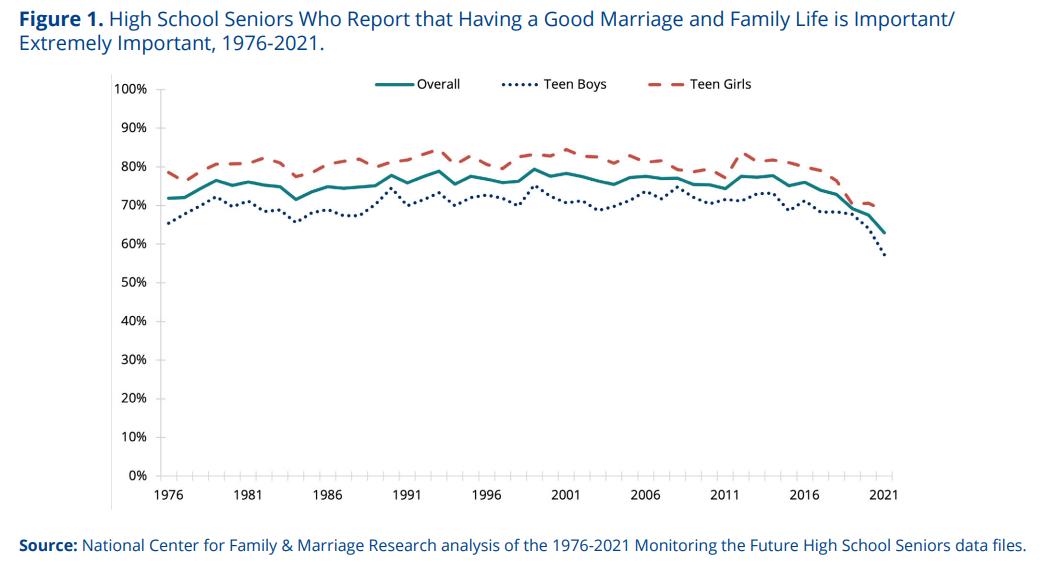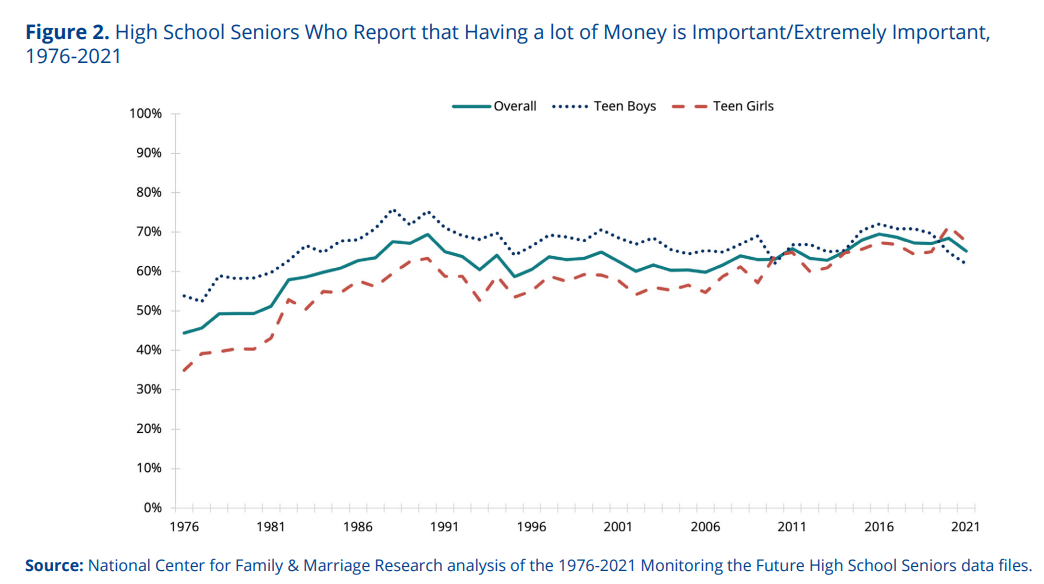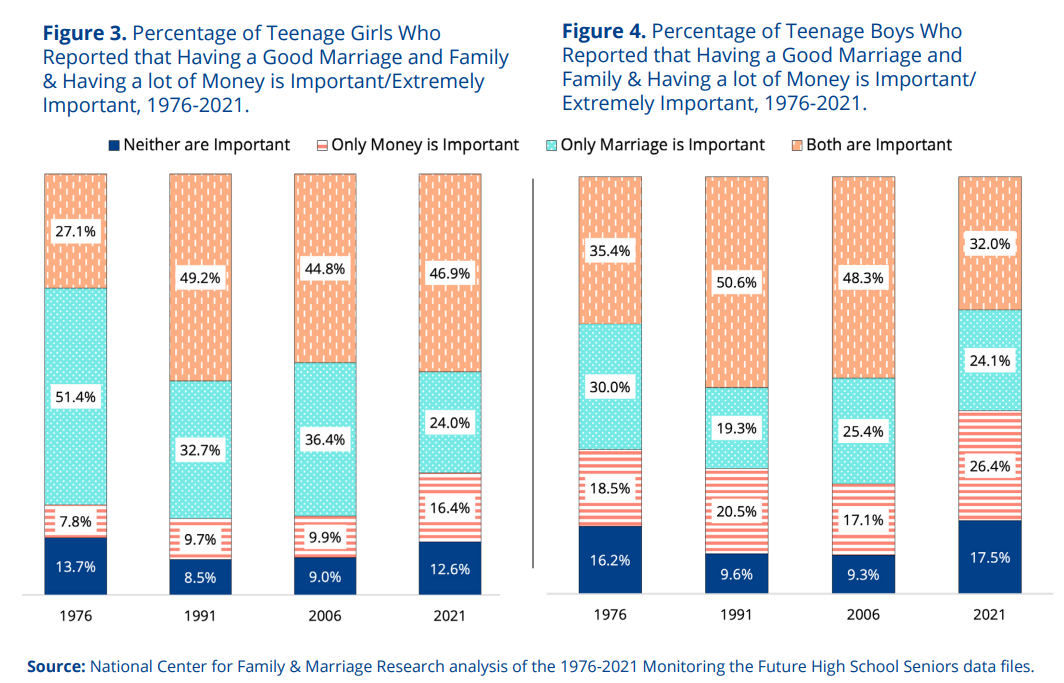45 Years of Teens’ Shifting Views on Marriage, Family, and Work
Karen Benjamin Guzzo, Katherine Graham, Wendy D. Manning, Susan L. Brown, and Krista K. Westrick-Payne
Preparing for and entering the workforce, forming a stable relationship, and having children are often considered key life events on the path to adulthood. However, over time, important societal and economic shifts have influenced when and how these life events happen—and may have also changed how youth who are beginning the transition to adulthood value these events.
Although most teens expect to marry and have children in the future, today’s young adults are delaying marriage and parenthood compared to just a few decades ago.1 This delay partly explains the lengthening of the transition to adulthood that has occurred in recent years.1-3 Driven by changes in the labor market, educational systems, and housing, it now takes young adults longer to finish schooling, secure a stable and good-paying job, and afford to live on their own.4 For example, youth today are facing greater job insecurity, rising educational costs, and reduced social mobility.5-7 For young people just entering adulthood, forming a family may seem less important (or less likely) as concerns over being able to achieve some level of economic security become more central.8-10 Additionally, changes in attitudes about women’s roles have spurred a large increase in women’s employment as women (and men) recognize the importance of having one’s own career and income.11,12
In this analysis, we considered how teens’ attitudes about financial success, marriage, and having a family have shifted along with these broader societal and economic changes. We used 45 years of nationally representative data from high school seniors provided by the Monitoring the Future study to examine teens who viewed “having a good marriage and family life” and “having a lot of money” as important or extremely important between 1976 and 2021. These metrics allowed us to gauge how teens viewed these two domains as being a key part of a “successful” adulthood. Are teens prioritizing economic success, family life, or a combination of the two? How have those priorities changed over time? We found evidence that the views of teen boys and teen girls on the importance of financial success, marriage, and having a family—and the combination of these views—have indeed shifted.
Findings
Most teens deemed both financial success and family as important/extremely important throughout the studied period. Figure 1 illustrates that the importance of having a good marriage and family life was largely stable from 1976 until the last decade, when it declined relatively sharply. Conversely, the importance of having a lot of money, as shown in Figure 2, increased since the 1970s.

There were also notable gender differences in responses over time. Between 1976 and 2021, more teen girls reported that having a good marriage and family life is important/extremely important than teen boys, although both groups experienced a decline in recent years. Over the past 45 years, there was a significant difference in the reported gaps between the percentages of teen boys and teen girls who reported that having a good marriage and family is important.a
- For teen boys, the share reporting having a good marriage and family life is important/extremely important hovered around two-thirds until the late 1980s, after which the share fluctuated between 70-75 percent until 2015. It declined sharply in recent years, reaching a low of 57 percent in 2021.
- For teen girls, the share reporting having a good marriage and family life is important/extremely important hovered between 78-85 percent through 2013, when it began to decline. By 2021, the share of teen girls reporting having a good marriage and family life is important/extremely important had fallen to 69 percent.

In 1976, the share of teen boys (54%) who reported that having a lot of money is important/extremely important was almost 20 percentage points higher than teen girls (35%). But beginning around 2010, these differences narrowed substantially, and by 2021 signs of a possible reversal are evident, with more teen girls (68%) than teen boys (62%) reporting money as important. From 1976 to 2009 the differences between teen boys and girls are statistically significant. However, once the first crossover occurred in 2010 and through to 2021, the differences are no longer consistently significant (except in 2012 and 2015).
- For teen boys, the share reporting that having a lot of money is important/extremely important increased steadily from the mid-1970s to around 1990. It declined a bit in the early 1990s but plateaued between 65-70 percent from the mid-1990s until 2014. From 2014 through 2018, the percentage was between 70-72 percent before a decline through 2021 to 65 percent.
- Teen girls had a similar upward trend in the share reporting that having a lot of money is important/extremely important from the mid-1970s to the early 1990s, along with a similar plateau during the1990s through 2000s. But beginning around 2010, the share of teen girls reporting money as important/extremely important increased more steadily than it did for teen boys, narrowing the gender gap and ultimately surpassing the percentage of teen boys for 2020 and 2021.

We also examined how attitudes on the importance of family and of money fit together—by looking at the share who considered both marriage/family and money to be important/extremely important, who considered just one of these to be important, or who considered neither to be important; we focused on select years in 15-year intervals. Results are shown for teen girls in Figure 3 and teen boys in Figure 4. Again, we see gender differences.
- In 1976, the most common response for teen girls (see Figure 3) was that only marriage was important (51%), but this response declined by more than half to 24 percent in 2021. Since 1991, the most common response for teen girls was to report both marriage and money as important (47% in 2021).
- However, as shown in Figure 4, teen boys have continuously reported both marriage and money as being important over the 45-year period with the highest proportion (51%) reporting this in 1991. Though the share declined to 32 percent in 2021, it remained the most common response.
- Notably, the percentage of teen girls (16%) and teen boys (26%) who reported that only money is important was at its highest level in 2021. This was the second most common response for teen boys in 2021.
- In 2021, just under one-quarter of teen boys and teen girls reported that only marriage and family life were important/extremely important.
Summary and Implications
In this analysis, we looked at long-term trends in high school seniors’ attitudes toward money and family to see how these societal changes might have filtered down into teens’ outlooks for the future and shifted teens’ priorities.
And, indeed, we do see evidence that teens are not immune to what is happening more broadly. While most teens continued to believe in the importance of marriage and family life, we also saw signs that the centrality of this component of life has declined, especially since the Great Recession in 2008.b Just under two thirds of high school seniors considered marriage and family life to be important in 2021, about ten percentage points lower than the peak in the 1990s. Conversely, nearly three fourths of high school seniors considered having a lot of money as important in 2021—a dramatic increase from 1976, when less than half considered it important.
These shifts have been particularly evident among teen girls, who emphasize the importance of both money and marriage/family life—or just money alone—more now than they did in the 1970s. This shift likely reflects the growing role of women’s economic contributions to both individual and family well-being. Many women (and men) will spend a substantial share of their adulthood single as marriage happens later (or not at all) or after experiencing a break-up, making the need to be economically self-sufficient vital. Moreover, even among couples, women’s contributions have become crucial for achieving and maintaining middle class status, and many women now contribute as much or more than their partner to household finances.13,14 Still, in 2021, more teen boys than teen girls reported that only money is important, and considerably fewer teen boys than teen girls reported that both marriage/family life and money are important. This suggests that views of men as providers and breadwinners are still common.
Does this mean that the adults of tomorrow are turning away from marriage and family life? Probably not—but it does suggest that economic worries play a role in how people prioritize their lives and see their futures. And even among those who think marriage and family life are important, whether these young people are able to actually marry and have the family they desire is unclear. Prior research shows that issues like debt heavily influence decisions about family behaviors.3,4 As such, efforts to improve job security, reduce the costs of higher education, and address other economic stressors may help people feel more confident in the future and be able to have the families and relationships they desire.
Methods
Our analyses used the 1976 through 2021 Monitoring the Future High School Seniors data. Only teens in the 12th grade who had never cohabited, married, or had children were included in the analyses. The final sample consisted of 90,788 teens (46,687 teen girls and 44,101 teen boys) across all years. The number of respondents varied somewhat within years with an abbreviated survey in 2020. For instance, in 1976, there were 3,039 relevant (Bachman et al., 2007) respondents,c and in 2021, there were 1,498 (Miech et al., 2022). All estimates were weighted to account for survey design.
Our focal attitudinal measures focused on family, marriage, and economic success, and we examined responses of “important” or “extremely important” in response to the following questions “How important to you in your life is having a good marriage and family life?” and “How important to you in your life is having lots of money?” We also combined the answers to these items to create a four-category measure: neither are important/extremely important; only money is important/extremely important; only marriage is important/extremely important; and both are important/extremely important.
We reported descriptive results and gender differences. We also used Chi-square tests to determine if the attitudes of teen boys versus teen girls were significantly different at or below a p value of 0.05.
Footnotes
a Using Chi-square analysis, we determined that the gap between the percentages of teen boys and teen girls who reported having a good marriage and family life is important/extremely important is statistically significant in all years except 2020. The lack of significance in 2020 may be due to the impact of Covid-19 on halting interviewing early.
b The US Federal Reserve categories the Great Recession from December 2007 to June 2009. We round to the mid-point of the Great Recession in 2008.
c In 1976, a total of 15,138 and in 2021 a total of 9,022 high school 12th graders were interviewed; however, only 3,039 and 1,498 12th graders respectively received the interview form that asked about the importance of a good marriage and family and the importance of having a lot of money.




